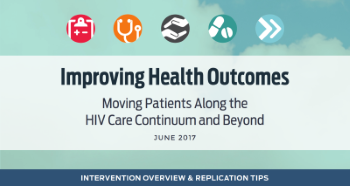Insights on ways that HIV care programs have improved health outcomes along the HIV care continuum. Resources include a manual, case studies, pocket guides, and TA webinars.
Components
- Intervention guide highlighting an evidence-informed innovative model of care, focusing on youth and the linkage to care step of the HIV care continuum. Disponible en Español.
Highlights of an evidence-informed innovative model of care focused on serving youth in the linkage to care step of the HIV care continuum.
Highlights from two linkage to care projects (active referral and electronic records exchange).
- This is an Evidence-Informed intervention that integrates jail-based case managers into the community HIV case management system. It will help to engage, and subsequently link, incarcerated individuals as they transition from jail to community.
Evidence-informed intervention that allows community-based case managers to connect via video chat with incarcerated clients prior to release.
- Evidence-informed intervention that integrates jail-based case managers to work with jail-based discharge planners and peers to support HIV-positive women as they transition from jail to the community.
- Highlights of a continuity of care/records retention project, with key information from the intervention, including key staff and participants, objectives for the interventions, rationale, method, key items to consider for replication and resources.
- Evidence-informed intervention that promotes HIV medication access, coverage, and pickup for individuals transitioning from correctional facilities.
Highlights from Wisconsin's recruitment program for HIV counseling, testing, and referral (CTR) services.
- My Health Profile Continuity of Care Record Intervention: Case Study, Overview, and Replication TipsPatient portal, leveraged across a regional health network, with critical health information to improve continuity of care.
Evidence-informed interventions along the HIV care continuum.
- Evidence-informed intervention that facilitates bidirectional information exchange between hospital system records and public health surveillance data to identify and link out-of-care HIV-positive clients back to care and treatment.
Highlights from linkage to care projects in correctional settings.
- Evidence-informed intervention that uses Disease Intervention Specialists (DIS) to more actively link clients to HIV care services.
Evidence-informed intervention demonstrating that members of high-risk groups are often more effective at identifying and recruiting HIV-positive and at-risk individuals than traditional testing and outreach models.
This resource was developed by

